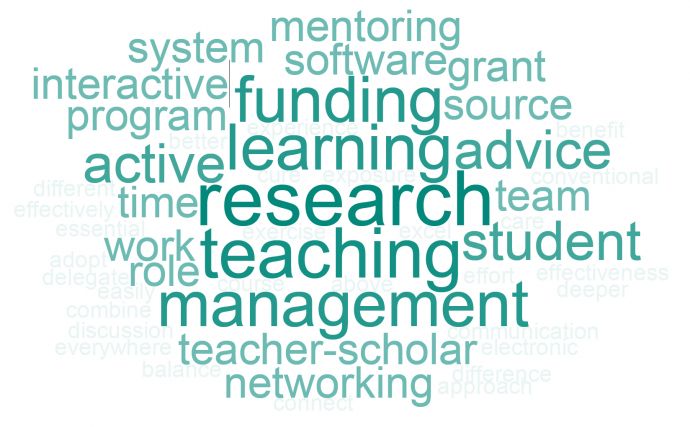Fulbright-Cottrell Workshop 2019
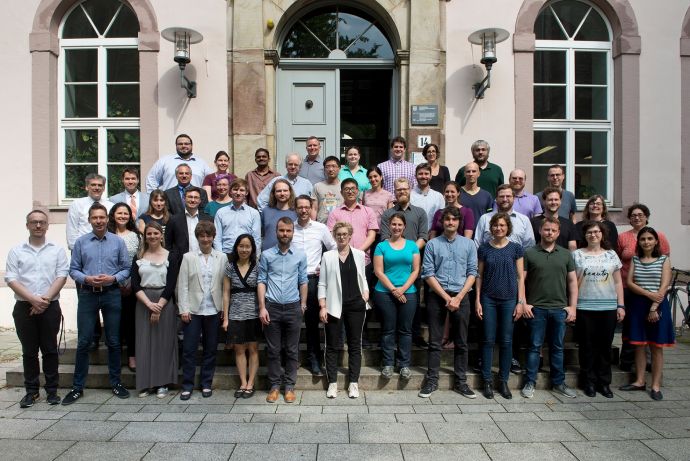
Info on the original two workshops:
2017: "Bridges to Germany" Workshop in Mainz
2018: Fulbright-Cottrell Junior Faculty Professional Development Workshop in Berlin
Fulbright-Cottrell Junior Faculty Professional Development Workshop, Version 3.0
Göttingen, June 3 - 5, 2019
Preparing university professors in the sciences for the future
Target Groups:
- Junior group leaders, habilitated researchers (including junior professors, Juniordozenten, and Privatdozenten), and postdoctoral researchers who are working or planning to work at a German university with teaching responsibilities in the fields of chemistry, physics, or astronomy.
- Academic leaders of German universities.
This second annual workshop aims to gather junior group leaders in the fields of chemistry, physics, and astronomy; their academic administrative leaders at German universities; experts in educational exchange from the Fulbright Kommission; and the Research Corporation for Science Advancement (RCSA) for a unique opportunity to further professional development.
The workshop offers training for junior group leaders in Germany on how to best implement evidence-based pedagogies, integrate research and teaching, use new strategies for communicating science to the public, and develop skills in time management, leadership, mentoring students, and networking. The workshop also engages the academic administrative leaders in Germany in a dialogue on how to leverage professional development for future academic leaders and increase the university's impact on society.
The workshop has the following objectives:
- Apply change theory to promote academic initiatives (new German tenure-track model). We will cover how junior faculty can maximize their chances for promotion by influencing change, and what skills are key for the transition to a tenure-track model.
- Apply communication skills that convince authority figures and rally subordinates: convincing and motivating effectively in an academic environment.
- Develop skills to optimize student learning: applying evidence-based methods on learning that transcend the classroom and aid research success.
- Examine the alignment of the Fulbright-RCSA Cottrell-Scholar Initiative with the 1000 New Tenure-Track Professors German Initiative: debunking the myth of the research-and-teaching zero-sum game. The top researchers are often the best educators and can bring universities to a higher level.
- Workshop program - Online schedule
Registration check-in begins on June 3 at 9:30, program begins at 10:30. Program concludes on June 5 at 16:30. Detailed and printable schedule - Workshop registration - Complete registration form
- Workshop venue: Niedersächsische Staats- und Universitätsbibliothek Göttingen
- Hotel accommodations with special rates for participants
at B&B Hotel Göttingen-City Reserve a room to attend the workshop - Workshop list of participants
All questions should be directed to the organizers, who can be reached at specialprograms@fulbright.de
The first evening of the workshop will feature a trilateral science slam (Germany - Russia - U.S.) at the Junges Theater in Göttingen. Six young German, Russian and U.S. American scientists present their original research results in their native languages (with simultaneous interpretation from Russian to English) during successive 10-minute rapid-fire “performances.”
Trilateral Science Slam on Monday, June 3 at 20:00 - Info and registration for the slam
The event is free and open to the public, but you must register in advance with the Junges Theater at the box office, by phone or email.
Brief profiles about the scientist-slammers, their slam topics, and the slam host: Profiles
The 2019 workshop is the third workshop of this series. The first workshop, "Bridges to Germany", was held in May 2017 in Mainz as part of the Cottrell Scholars Collaborative. The Fulbright-Cottrell Second Junior Faculty Professional Development Workshop took place in June 2018 in Berlin with support from the Federal Ministry of Education and Research (BMBF).
These workshops are an initiative that adapts aspects of two established programs offered by the Cottrell Scholar Collaborative to the German academic landscape: the CSC New Faculty Workshop and the CSC Academic Leadership Training Workshop.
Some feedback from participants in the 2018 workshop:
"I learned a lot about teaching, some new details related to funding, and did do some potentially helpful networking."
"The 'active teaching' lessons were very insightful. The contact with people just a few steps ahead in career were encouraging."
"I liked the emphasis on the teaching side. I find teaching an essential part as we are responsible to equip the students with the knowledge and tools they need to drive our world forward."
"I learned a lot of tricks to make the most of combining teaching and research."
"[The science slam] was exciting and interesting, and I am glad to know that such events exist - it was my first science slam and I will attend more in the future, and spread the word about them. It was also a good chance to chat with other attendees in a more relaxed setting."
"[The science slam] is another way to communicate about science, and it is ludic. It makes sense in the framework of the workshop."
The workshop is sponsored by the Federal Ministry of Education and Research and the Fulbright Commission, which administers the annual https://fulbright.de/stipendien/programm/fulbright-cottrell-award-uni-ausseruniversitaere-forschungseinrichtungen in collaboration with the American Research Corporation for Science Advancement.
Moments from the 2019 workshop
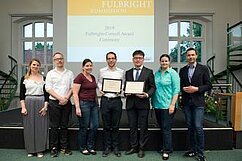
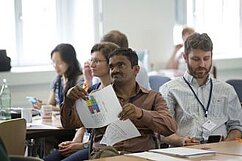
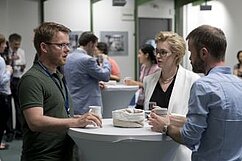
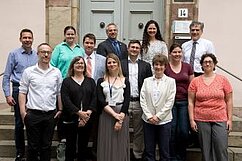
Confirmed Speakers
- Ricarda Blumentritt, Georg-August-Universität Göttingen
- Eberhard Bodenschatz, Max Planck Institute for Dynamics and Self-Organization
- Andrew Feig, Wayne State University
- Carla Fröhlich, North Carolina State University
- Olga Garcia Mancheño, Westfälische Wilhelms-Universität Münster
- Kathryn Haas, St. Mary's College
- Ute Hellmich, Johannes Gutenberg University Mainz
- Rigoberto Hernandez, Johns Hopkins University
- Justin Hines, Lafayette College
- Arnulf Quadt, Georg-August-Universität Göttingen
- Silvia Ronco, RCSA
- Christian Schöpper, Georg-August-Universität Göttingen
- Steffen Schumann, Georg-August-Universität Göttingen
- Cosima Schuster, DFG
- Yana Vaynzof, Universität Heidelberg
- Olalla Vázquez, Philipps Universität Marburg
- Rory Waterman, University of Vermont
- Michael Wilczek, Max Planck Institute for Dynamics and Self-Organization
Organizers
- Carla Fröhlich, North Carolina State University
- Steffen Schumann, Georg-August-Universität Göttingen
- Olalla Vázquez, Philipps Universität Marburg
- Michael Wilczek, Max Planck Institute for Dynamics and Self-Organization
